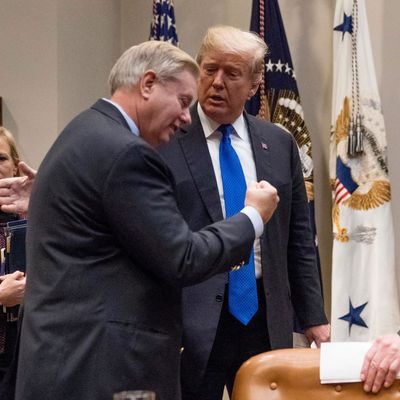
Once upon a time, Lindsey Graham, Joe Lieberman, and John McCain were known as the Senate’s “Three Amigos.” They were a jolly trio devoted to the occasional bipartisan domestic initiative, a sturdy independence from the ideological commissars of American politics, and a common commitment to a hawkish foreign policy and robust use of U.S. military might. This last source of camaraderie, in fact, gave rise to their nickname:
After the 9/11 attacks, the trio made routine visits to Afghanistan and Iraq. It was on one of those trips when General David H. Petraeus gave the nickname to the triumvirate, which became vocal proponents of President George W. Bush’s “surge” strategy in Iraq.
“They were the three amigos. They were three inseparable friends,” Petraeus told ABC News. “At some point, I just started saying we had the three amigos coming in again.”
With Lieberman’s retirement from the Senate in 2013, and McCain’s recent death, Graham is now the last of the “Amigos.” And given the atmosphere of partisan and ideological polarization, and the enormous pressure on Republicans to bend the knee to Donald Trump, it’s probably inevitable that the South Carolinian’s main mission is to encourage Donald Trump to listen to his inner war hawk.
Graham managed to exceed other 2016 Republican candidates in excoriating Trump before he won the nomination, famously calling him a “xenophobic, race-baiting religious bigot,” and “unfit for office.” And even after Trump became president, Graham kept his distance, though he supported virtually all of the new administration’s policy initiatives.
But by the fall of 2017, the two men were regularly playing golf and Graham definitely had POTUS’s ear for extended periods of time, as Allan Smith reported at the time:
As one source characterized it, the relationship with Graham is not so much about policy as it is that the president simply “likes” the senator.
For Graham, the source said the relationship was fostered as a result of Graham having “smartly adapted” to the realities of Trump sitting in the White House.
“At the end of the day, Lindsey Graham is a wily politician,” they said. “And you can’t underestimate that.”
More recently, Graham made headlines by endorsing a post-midterms firing of Attorney General Jeff Sessions — a man he used to adamantly defend —which is probably Trump’s fondest wish at the moment. And now, unless you dismiss Bob Woodward’s new book entirely, we know more about how Graham uses his face-time with the commander-in-chief, as the Daily Beast explains:
In September 2017, just days after President Donald Trump dubbed North Korean leader Kim Jong Un “little rocket man,” the president assembled his national security team at the White House to discuss U.S. policy toward the hermit kingdom …
Sen. Lindsey Graham (R-S.C.) attended, and offered a brazen suggestion for dealing with Kim. Graham recommended that Trump encourage the Chinese government to assassinate Kim and replace him with a North Korean general whom “they control.”
Trump obviously never acted on the advice, but it underscored the degree to which Graham has leveraged his personal rapport with Trump in efforts to counteract the president’s less hawkish instincts, and push the U.S. toward a more aggressive military posture.
Trump’s views on national security issues aren’t easy to label — “Jacksonian” might be the best term for them — but they definitely combine an antipathy towards international institutions and commitments, a suspicion of conventional bipartisan thinking, and a willingness to use maximum force as a deterrent against anyone doubting his or the country’s power. Graham appears to have worked hard to counteract the advice of conflict-shy civilian aides and cautious military advisors to encourage Trump to indulge his blood lust and fear of looking weak:
Graham’s spokesman Kevin Bishop declined to comment to The Daily Beast on Woodward’s account of the meeting last year, but acknowledged that Graham has sought to encourage Trump to adopt a more hawkish foreign policy, occasionally in contrast to some of the president’s senior military and foreign-policy aides.
Woodward, naturally, is more vivid about Graham’s advice, notably in this vignette about Afghanistan policy:
“Do you want on your résumé that you allowed Afghanistan to go back into the darkness and the second 9/11 came from the very place the first 9/11 did?” Graham asked the president, rhetorically, in an effort to encourage Trump to step up U.S. troop commitments there.
“Well, how does this end?” Woodward recounts Trump asking. “It never ends,” Graham replied, in rhetoric reminiscent of the Trump-maligned neoconservatism of George W. Bush. “It’s good versus evil. Good versus evil never ends.”
Reportedly Graham’s influence has waxed as that of Senate Foreign Relations Committee chairman Bob Corker — soon to retire — has waned. And that worries some Republicans wary of how Graham encourages Trump’s impulsiveness:
“Lindsey Graham has been virtually wrong on every foreign policy decision in the last two decades. From Iraq to Libya to North Korea,” said a senior GOP congressional aide. “We would be at war with half the world if Lindsey had it his way.”
For all of the humor that Graham deploys in public and in private, and despite the hagiographical haze that has naturally enveloped his late friend John McCain, it remains true that the Three Amigos weren’t joking around about their determination to reshape the world with U.S. military force. That point of view was bad enough when it was being advanced during the administration of George W. Bush, who acknowledged some limits on U.S. power. For a president like Trump who seems obsessed with perceptions of strength and sometimes addicted to rage, it’s frightening.






























